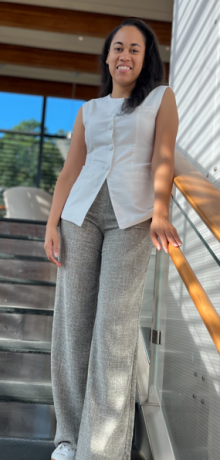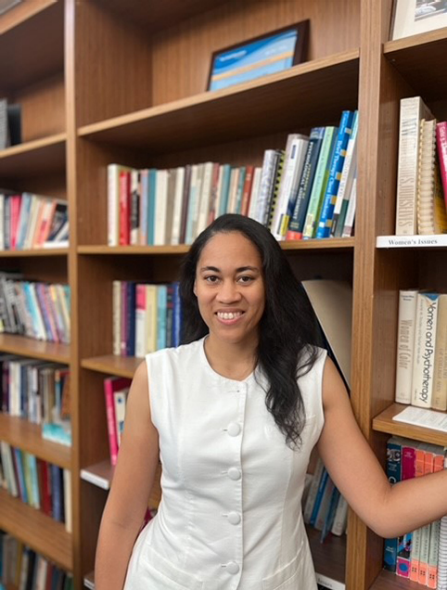Roaming the Halls with Courtney Copeland
A passion for community, a dedication to serving and a mission to share the journey
BY JANA EISENBERG
PhD student Courtney Copeland’s affinity for mental health started early during high school when she interned in her school’s counseling center. “I worked alongside the social worker, psychologists and counselors, and doing peer mediations,” said the Buffalo native. She was also exposed to the field through close family members’ careers.
Between 2006 and 2015, Copeland earned a BA (psychology), and two MS degrees (one in clinical mental health; the other in school counseling). She was working as an elementary school counselor in North Carolina. But she quickly concluded that she wanted to do more, and on a larger scale.
Then the pandemic struck and two of her students died. “It hit me very hard. I was accepted into the PhD program and came back to Buffalo during the shutdown. I started the program, and also cared for my grandparents. I was part of my communities again in a different way,” Copeland said.
Being a Black woman working for a doctorate could feel daunting, Copeland noted. But in her experience, especially having attended an HBCU (historically Black college/university), it was realistic. “I can see and touch it. Friends and former classmates are my role models,” she said. “They’ve shown me what is possible.”
One of her research interests, and now her dissertation topic, is deeply personal. “I’ve been around sports and Black athletes most of my life. I became interested in sports psychology. At UB, I’ve worked with athletes, focusing on mental health. This feels like ‘where I belong,’” she said.
Courtney Copeland, PhD student
“‘Masculinity’ can almost be a bad word—we usually refer to it in the hegemonic sense: ‘toxic masculinity.’ We don’t see the resilience, or the advocacy that is needed, especially and historically, in our Black male athletes.”
Copeland, also an enrolled Seneca Nation member, recently received an award from the UB Department of Indigenous Studies for her research.
“I support and am involved in both Black and Seneca communities. Coming back to Buffalo was an opportunity to continue this support. I feel fortunate to be working alongside the Seneca Nation in Buffalo,” said Copeland.

“It’s also opened my eyes to the historical harm done, especially through research, for example, not sharing resources garnered from research with its participants.”
Copeland co-hosts and founded “Diagnosing Sitcoms and Movies,” a podcast described as “a deep dive into Black television shows and films…to help expand the conversation around mental health.”
The podcast brings to life her commitment to making her knowledge accessible. “I have a responsibility to share the academic and scientific information that I’m receiving with the community. The podcast is fun, and it’s a way to get the conversation started about mental health—to alleviate some of the stigma,” she said.
Her dissertation advisor and professor, Amy L. Reynolds, chair of the Department of Counseling, School and Educational Psychology, described Copeland as “one of our most creative and community-minded doctoral students. An advocate for social justice issues and sensitive to meeting the needs of those who are underserved or overlooked, she donates time to community causes, including Native American organizations and projects for Black youth in Buffalo.”
Copeland noted, “One of my greatest accomplishments at UB is that another Indigenous female who I know from the community is entering into the program. It is important both that I go, and that I take my people with me.”
